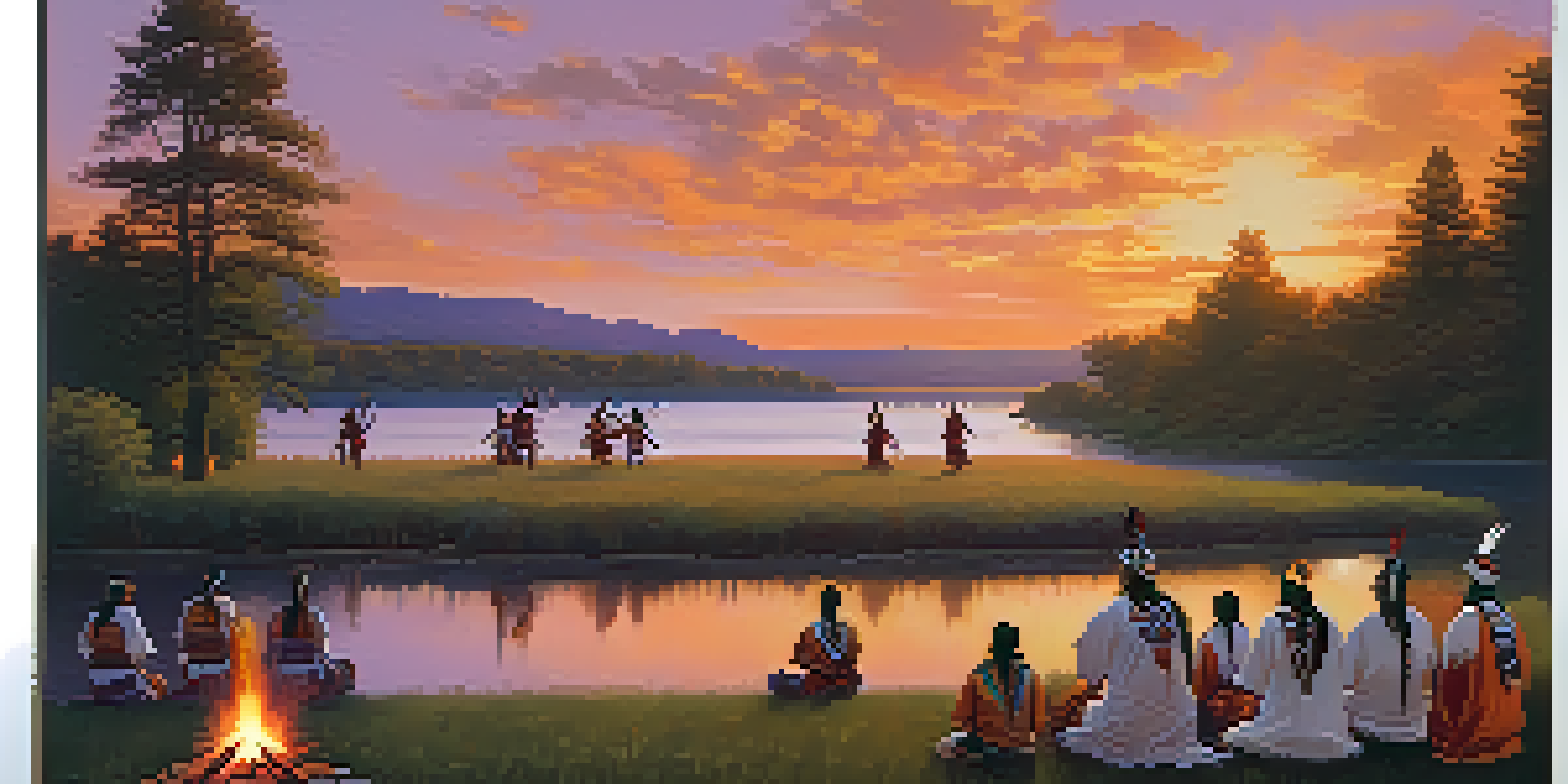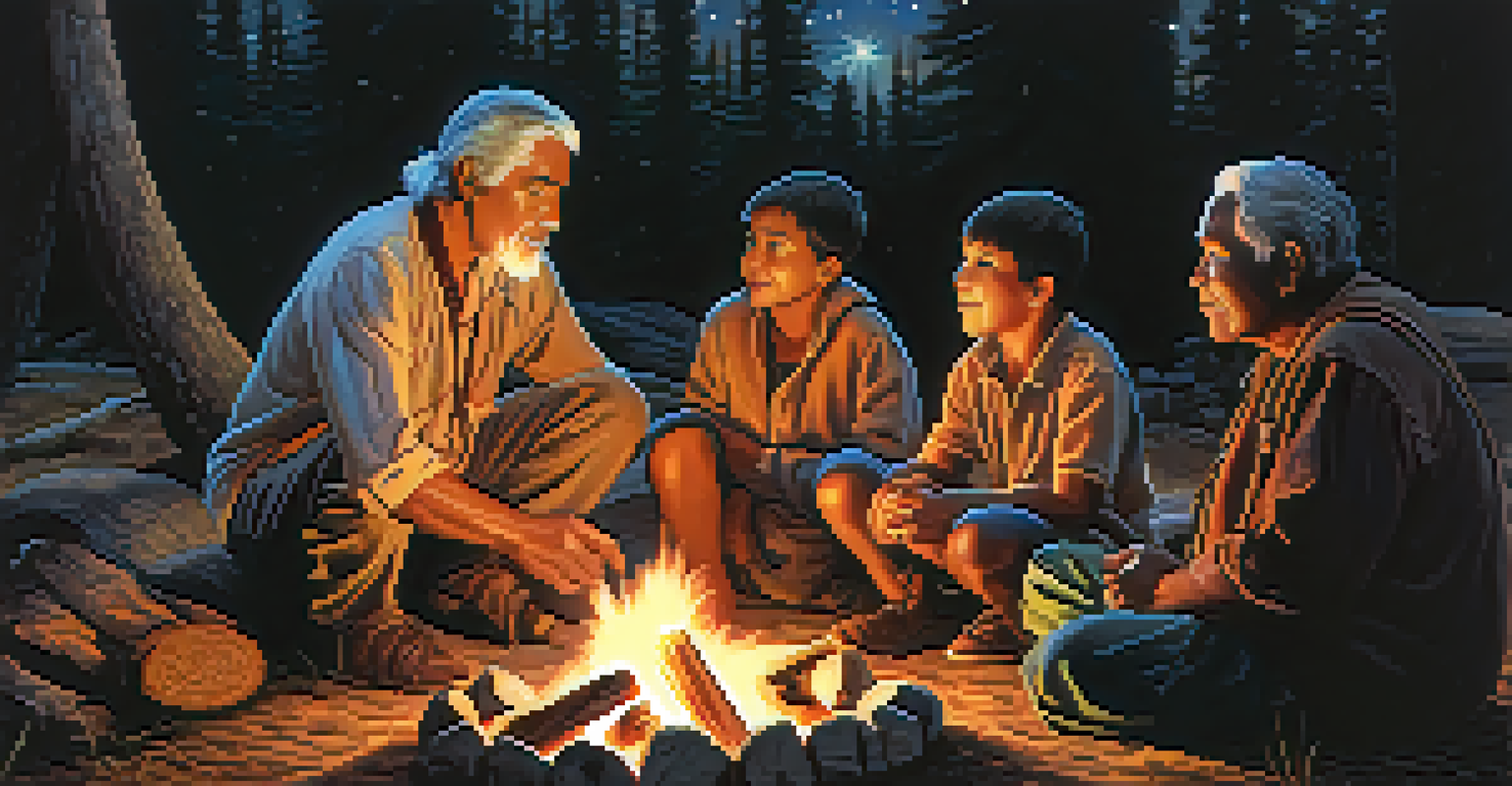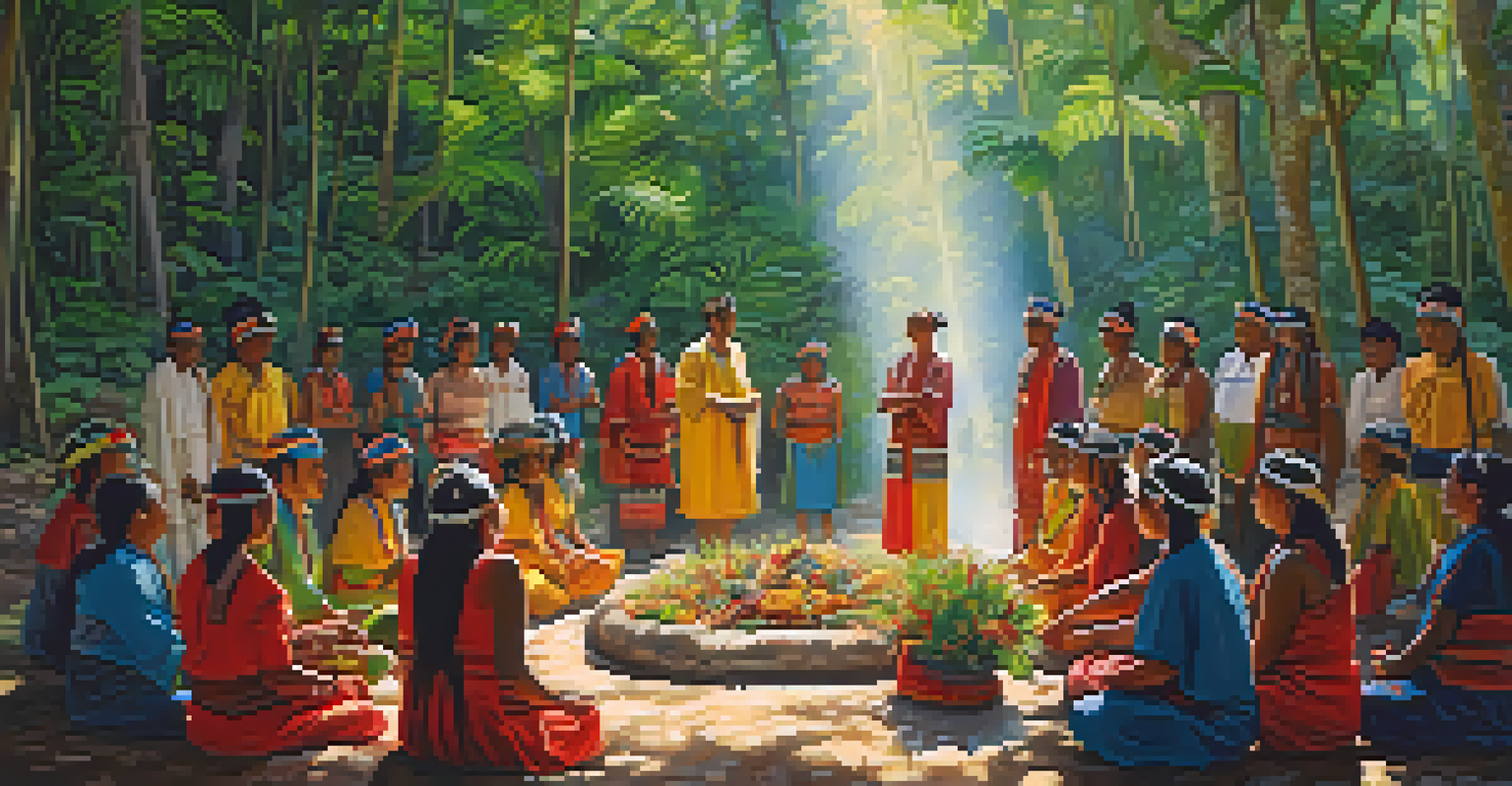Exploring Spirituality's Role in Indigenous Cultures Worldwide

Understanding Spirituality in Indigenous Cultures
Spirituality often serves as the foundation for Indigenous cultures, shaping their identity and worldview. It encompasses beliefs, practices, and values that connect communities to their ancestors, the land, and the cosmos. This connection fosters a deep sense of belonging and purpose, allowing individuals to navigate their lives with meaning and direction.
Indigenous spirituality is not just a belief system; it is a way of life that connects us to the land, our ancestors, and each other.
For many Indigenous peoples, spirituality is not confined to a single belief system or organized religion; rather, it is woven into daily life. Rituals, storytelling, and ceremonies are integral, embodying the teachings and traditions passed down through generations. This holistic approach to spirituality emphasizes the interconnectedness of all living things, reinforcing a communal bond.
In essence, spirituality in Indigenous cultures is about harmony and balance, both within the self and with the environment. It serves as a guiding force, influencing everything from governance to social structures. By understanding these spiritual frameworks, we can appreciate the richness and diversity of Indigenous traditions.
The Role of Nature in Indigenous Spiritual Beliefs
Nature holds a sacred place in many Indigenous cultures, often seen as a living entity that deserves respect and reverence. Mountains, rivers, trees, and animals are not just resources; they are considered relatives or spirits that guide and protect communities. This profound connection to the natural world shapes their spirituality and daily practices.

For example, in many Native American traditions, the Earth is viewed as a mother figure, providing sustenance and shelter. Ceremonies celebrating the changing seasons often reflect gratitude toward nature, reinforcing the belief that humans are stewards rather than owners of the land. Such rituals create a sense of responsibility to care for the environment.
Spirituality Shapes Indigenous Identity
Spirituality is foundational in Indigenous cultures, connecting communities to their ancestors, the land, and the cosmos.
This relationship with nature also influences Indigenous healing practices, where plants and animals play a crucial role in spiritual and physical well-being. By understanding the interconnectedness of all life, Indigenous peoples emphasize conservation and sustainability, ensuring that future generations can inherit a healthy planet.
Indigenous Spirituality and Community Identity
Community is central to Indigenous spirituality, where collective identity is often celebrated through shared beliefs and practices. The rituals and ceremonies that bring people together not only reinforce cultural values but also strengthen social bonds. This sense of belonging fosters resilience in the face of external challenges.
In every Indigenous culture, the spiritual connection to nature is profound, teaching us that we are not separate from the Earth but part of it.
Storytelling is a vital aspect of this communal identity, serving as a tool for teaching and preserving traditions. Elders play a crucial role, passing down wisdom and teachings that shape the community's moral compass. These narratives often convey spiritual lessons, ensuring that the values remain alive and relevant.
Furthermore, Indigenous spirituality often encourages communal decision-making, where the well-being of the group takes precedence over individual desires. This collective approach not only nurtures a strong sense of identity but also promotes cooperation and harmony within the community.
Rituals and Ceremonies: Spiritual Expressions
Rituals and ceremonies are tangible expressions of spirituality in Indigenous cultures, providing a framework for expressing gratitude, seeking guidance, and marking significant life events. These practices vary widely across cultures, yet they share common themes of connection, reverence, and transformation. Whether it's a coming-of-age ceremony or a seasonal celebration, each ritual conveys deep spiritual meaning.
For instance, the Sun Dance, practiced by some Plains tribes, is a ritual of renewal that involves dancing, fasting, and prayer. Participants seek spiritual visions and healing for themselves and their communities. Such ceremonies not only reaffirm individual faith but also reinforce communal ties, illustrating how spirituality is a shared experience.
Nature is Sacred in Indigenous Beliefs
Indigenous spirituality views nature as a living entity that guides and protects communities, emphasizing stewardship and responsibility.
Moreover, these rituals often adapt over time, blending traditional practices with contemporary influences while maintaining their core spiritual essence. This adaptability ensures that spirituality remains relevant, allowing Indigenous cultures to thrive in a changing world.
The Impact of Colonization on Indigenous Spirituality
Colonization has profoundly impacted Indigenous spirituality, often leading to the suppression of traditional beliefs and practices. As colonizers imposed their religions and values, many Indigenous communities faced the loss of sacred sites, languages, and cultural expressions. This disruption has created a complex relationship between Indigenous peoples and spirituality, as they navigate the challenges of cultural survival.
Despite these obstacles, many Indigenous communities have shown remarkable resilience, working to revitalize their spiritual practices and reclaim their identities. This resurgence often includes the revitalization of languages, ceremonies, and traditional teachings, as they seek to heal the wounds inflicted by colonization. It's a powerful testament to the enduring nature of Indigenous spirituality.
In the face of ongoing challenges, the blending of traditional and contemporary practices has emerged as a way to honor the past while adapting to the present. By embracing a dynamic approach to spirituality, Indigenous peoples continue to assert their cultural identity and strengthen their communities.
Global Perspectives on Indigenous Spirituality
Indigenous spirituality is a global phenomenon, with diverse expressions found across continents. From the Aboriginal Dreamtime stories in Australia to the Sami spiritual practices in Northern Europe, each culture offers unique insights into the relationship between spirituality and daily life. These varied perspectives highlight the importance of cultural context in understanding spirituality's role.
Moreover, globalization has sparked a renewed interest in Indigenous spirituality, as people seek alternative ways to connect with their roots and the natural world. This curiosity can lead to cultural exchange and appreciation, fostering greater awareness and respect for Indigenous traditions. However, it's crucial to approach these practices with sensitivity and authenticity, honoring their cultural significance.
Community Bonds Strengthen Spirituality
Rituals and storytelling foster a strong sense of collective identity and resilience within Indigenous communities.
As we explore these global perspectives, we can learn valuable lessons about interconnectedness, resilience, and the importance of preserving spiritual traditions. By embracing the wisdom of Indigenous peoples, we can cultivate a deeper understanding of our shared humanity and the diverse ways we seek meaning in our lives.
The Future of Indigenous Spirituality
The future of Indigenous spirituality is a dynamic tapestry, woven from the threads of tradition and innovation. As communities work to revitalize their spiritual practices, there is a growing emphasis on intergenerational knowledge transfer. Elders are sharing their wisdom with younger generations, ensuring that cultural teachings continue to thrive in a modern context.
Additionally, the integration of technology has opened new avenues for spiritual expression and community-building. Social media platforms allow Indigenous voices to share their stories, struggles, and spiritual beliefs with a global audience. This digital landscape provides opportunities for connection and solidarity among Indigenous peoples worldwide.

Ultimately, the future of Indigenous spirituality hinges on resilience, adaptability, and respect for cultural heritage. By supporting Indigenous rights and promoting awareness of their spiritual traditions, we can help foster a world where these rich cultural expressions are celebrated and preserved for generations to come.